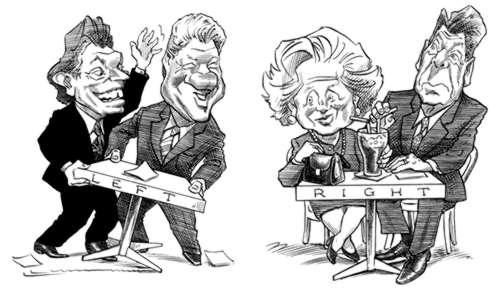- Economics
- International Affairs
R
onald Reagan and Margaret Thatcher successfully promoted lower income taxes, privatization of state enterprises, weaker unions, and a smaller role for government. The great popularity of their programs induced liberal, labor, and social-democratic governments around the world to reverse their traditional ideological positions and join in promoting free-market policies. Paradoxically, it turned out that often only these parties on the left had enough political support to succeed in introducing the changes that were needed.
Market reforms initiated by the left started in 1984 in New Zealand. The labor government enacted legislation transforming that small nation’s economy into one of the freest in the world. It privatized the postal system and many other public enterprises and reduced tariffs to one of the lowest levels anywhere. The country switched from highly centralized collective bargaining of wages and employment to a system that gives employers considerable discretion to hire and fire and to pay market-determined wages.
 |
|
Illustrations by Taylor Jones for the Hoover Digest. |
Perhaps the best example is in the United States. The Democratic Party has in the past strongly supported big government, but under President Bill Clinton, it took heed of the popularity of the Republican Party’s Contract with America, which advocated less paternalism and smaller government. Clinton declared that “the era of big government was over.” His administration then radically reversed the stand of Democrats on welfare by limiting how long families could remain on government assistance, reducing the budget deficit, and encouraging business.
Flexibility
The welfare reform act supported by President Clinton is particularly instructive since initially the Democratic Party strongly opposed requiring women on welfare to take jobs. But the growing perception among party stalwarts that this was becoming a winning issue for Republicans forced the president to radically change his position. The paradox is that Clinton can now claim welfare reform as one of his crowning achievements.
Another example is found in Mexican economic policies during the 1980s and ’90s. The Institutional Revolutionary Party (PRI), which just lost the Mexican presidency after seven decades in power, had been a very strong advocate of government ownership of heavy industry, prohibitive duties on imports to protect domestic companies, and detailed regulation of labor and financial markets. But starting with President Miguel de la Madrid in the early 1980s, the PRI responded to free-market critics of Mexico’s weak economic performance by selling numerous government-owned enterprises, partially privatizing the social security system, and becoming a strong advocate of a free-trade agreement with its large former “enemy” to the north, the United States.
In Argentina, the Senate recently reacted to very high unemployment by passing a labor-market reform bill that weakens union power and gives the country’s employers much more flexibility in hiring and firing. This reform is being promoted by the new center-left government of Fernando de la Rua after the failure of attempts to reform the labor market by the previous conservative government of Carlos Menem.
Recent policy changes in Germany and France provide impressive examples of the flexibility of party ideology. Both nations suffered high unemployment and slow growth during the 1990s, in good measure because of heavy-handed regulation of labor and other markets. Conservative governments in these nations accomplished little in the way of serious market reform despite considerable reform rhetoric. Left-democratic governments were elected a couple of years ago in both countries with platforms of cutting unemployment and raising growth by expanding government regulation.
Yet while each regime started out by introducing more government controls, including a law to implement a 35-hour workweek in France, both rather quickly changed course and have moved closer to Britain’s Labour Party under Prime Minister Tony Blair. German chancellor Gerhard Schröder proposes to slash corporate taxes, encourage start-ups, and provide tax breaks for private pension plans. French premier Lionel Jospin has quietly liberalized the French labor market and promoted a more globally competitive financial system with reduced governmental control.
If a dedicated cold warrior such as Richard Nixon could seek agreement with communist China against a common enemy, the Soviet Union, it is a relatively small step for Tony Blair to embrace markets and for German Social Democrats to support much lower taxes on business.







